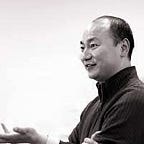Dima Gorelik
GUITARIST & Composer
Interview at The talk Hosted by Micheal H.
“We are exploring artists that interest us personally. It’s a personal quest.”
Dima Gorelik is an Israeli guitarist and composer with Ukrainian roots. Playing and composing music from a very young age, he started his formal education under the supervision of Shai Cohen — Israeli saxophonist, composer, and multi-instrumentalist. While studying at Carmel Zvulun Music College, Gorelik frequently collaborated with Arnie Lawrence and other remarkable artists, such as Avishai Cohen Tp., Omer Avital, Adam Nussbaum, Anat Cohen, Shai Maestro, Daniel Zamir, Eli Degibri, Itamar Doari, Omri Mor, et al.
At the same time, he was awarded The America-Israel Cultural Foundation Prize twice. From 2002 to 2005 Gorelik served in IDF, where he was given the Outstanding Musician status by the Israeli Ministry of Culture.
Gorelik has taken part in numerous recordings, both as leader and sideman, including his “Dima Gorelik 3O” project, “Anno Domini” project, and a duet album with Vladiswar Nadishana, with Joszko Broda, as a co-creator of Project “Debora“.
Touring as a leader and solo in “Dima Gorelik 3°” he took part in the festivals, such as “Warsaw Singer Festival” or “Palm Jazz Festival”, recorded in “Studio Agnieszki Osieckiej” and took part in TV Programs such as “Pytanie na Śniadanie“, “Pegaz“, “Halo Polonia” and others.
In 2010, Gorelik was invited to Poland by Krzysztof Kobyliński, where he was performing and recording with Joey Calderazzo, Erik Truffaz, Trilok Gurtu, Louis Sclavis, Clarence Penn,, Yasushi Nakamuro,, Brad Terry, Ziv Ravitz, Zohar Fresco, David Kuckhermann, and others.
Currently living in Warsaw, he has been creating in his Trio, as a solo artist and as a sideman, together with, Erik Truffaz, Zohar Fresco, Anna Maria Jopek, Vladiswar Nadishana, Krzysztof Scierański, David Kuckhermann, Zbigniew Namysłowski, Stanisław Soyka, Aukso, Vishwa Mohan Bhatt, Janusz Muniak, Joszko Broda, Maciej Obara, Maria Pomianowska, Wojciech Waglewski, Grażyna Auguścik i Adam Bałdych.et al.
Gorelik is continuously exploring his musical self and developing his remarkable skills, often mixing jazz with ethnic music.
Why Music?
As a kid music for me was a tool to connect my true self. Every child feels a strong dependency on one’s parents and many physical and mental limitations. Grown up people have the same things, just less noticeable. Music was the first “legal” way for me to be in a space, where those limitations are temporary and conditional. It’s not more than just a game. I am much bigger than that. In music that’s obvious.
Who or what inspired you to pursue a career in music and who or what have been the most important influences on your musical life and career?
My dad inspired me a lot. He encouraged me to do what I’m really good at, and not be frightened by those who say that I can’t for any kinds of reasons.
What have been the greatest challenges of your career so far?
Speaking of career, a challenge was to survive during Covid times. I decided on concentrating on producing, in order also to improve my production skills for my projects as well. I think it worked.
Which performances/recordings are you most proud of?
Traditionally I’m always most proud of the latest recordings, because, as I already said, I think I improve my skills. Lately we recorded a trio with Krzysztof Ścierański. But also it was a manifest of the new possibilities of having our studio. Of course it sounds different. And I think people liked it.
Do you have a favorite concert venue to perform in and why?
No. Venues are less important to me. What is important is my state during playing, as egoistic it sounds. I work a lot on coming to play in a state, where I’m most opened for the processes that are going to happen to me and the audience. A venue is also a part of that, but I’m doing everything to be less dependent on that.
What do you feel needs to be done to grow jazz music audiences/listeners?
I think that already in the content of a question, there’s an answer. We found ourselves, expecting that genres from the past will be popular in the present. Without any serious renovation. It’s impossible. In 20’th century a massive industry of records was making billions of dollars every year. As a result journalists were analyzing, and creating more and more names for genres. Right now there’s no record industry. So journalists don’t work. As a result we’re stuck with the same definitions, like 30 years ago. When we think of definition, like jazz we should consider what happened in the last 30 years. Maybe the definition of jazz is irrelevant. Only as a museum phenomenon. But something much wider is happening, and it needs to be defined. Then it will be easier to think of a growing audience around it.
As a musician, what is your definition of success?
Success is understanding that today I was a part of very exciting process. And understanding that as a result I became a better version of myself.
What do you consider to be the most important ideas and concepts to impart to aspiring musicians?
We’re musicians to be better people.
What is your idea of perfect happiness?
Being me is enough.
Talk About your concert :
On August the 6’th Dima Gorelik Trio is playing at Elijazz jazz club — Bydgoszcz. And on the 7’th at
PROM Kultury Saska Kępa — Warsaw at “Kulturalne Dachowanie” festival
We have a new member in our band — Inbar Elnatan, who is the younger brother of Shachar Elnatan. Some new music — come to see, it’s going to be interesting!
You can checkout Dima GORELIK social presence at :
INSTAGRAM : @dimagorelik
SPOTIFY : dima gorelik
YOUTUBE : @DimaGorelik
FACEBOOK : @dima.gorelik.10
